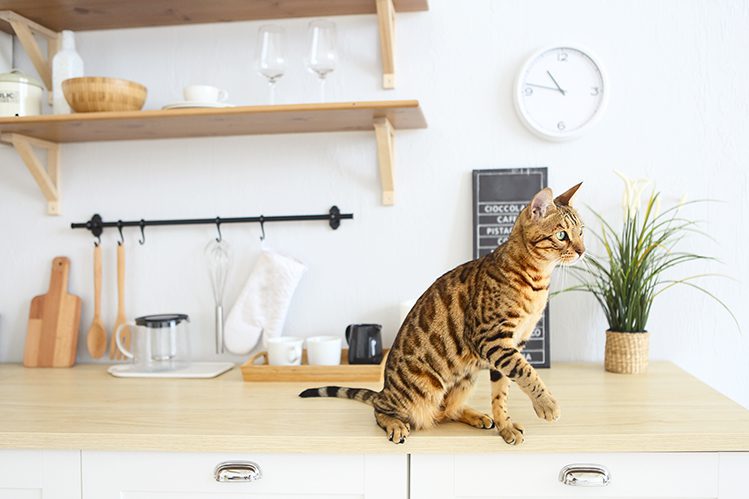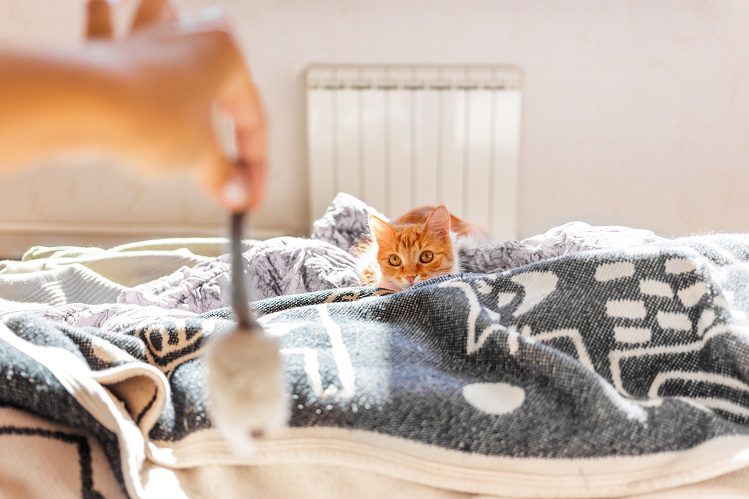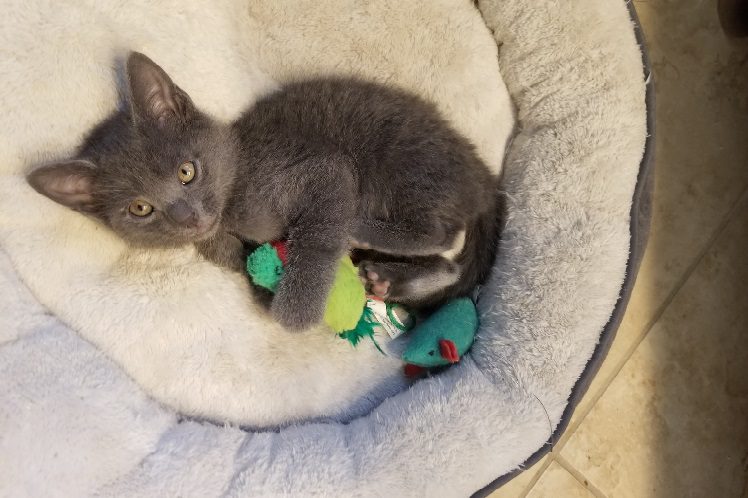
The first days of a kitten in a new home, or 12 steps to successful adaptation
Little kittens, like children, are completely dependent on our participation, care and love. From how you introduce the kitten to your home and others, how you convey the rules of behavior to him, his further happiness will depend.
We will tell you how to help your pet adapt to a new place in 12 steps and how to make this world kind and friendly for him.
For a kitten, moving to a new home is a happy and very exciting event. Absolutely every kitten experiences stress when moving, and this is normal. Try to put yourself in the place of a crumb: he broke up with his mother, brothers and sisters, left a familiar home, then he was taken somewhere for a long time, and now he found himself in a completely unfamiliar room with new smells and new people. How can you not be scared?
The task of a caring owner is to reduce this stress as much as possible and help the baby gently adapt to new conditions.
We know how to do it in 12 steps. Go?

- Step 1. Get everything that the kitten will need for the first time in advance. This is food (the kind that the kitten was fed by the breeder), two bowls (for water and food), a couch with high sides, a tray with wood filler, a carrier, several toys, a scratching post, a complete first aid kit, cosmetics and grooming tools. When a kitten appears in your house, he will need all the attention. You will not have time to choose certain goods, so it is advisable to prepare them in advance.
- Step 2. Prepare the house in advance for the appearance of a kitten. Isolate cables, remove small and potentially dangerous objects from the pet’s access area with which he can come into contact. Make sure that the trash can, household products, medicines and sharp objects are out of reach for the baby. Be sure to install anti-cat screens on the windows and put protection on interior doors so as not to accidentally pinch the tailed mischievous. It is better to prepare a safe space in advance so that later nothing distracts you from building a good, trusting relationship with your pet.
- Step 3. Take a few days off. Leaving a pet in an unfamiliar room alone is undesirable on the first day or two. You should definitely help him get comfortable in a new place and instill rules of conduct. From the very first day in the new house, the baby needs to be taught to the tray, to his nickname, to the couch. In addition, the kitten will be simply scared. He needs his loving, caring person more than ever.
- Step 4. Ask the breeder for a bedding, diaper or textile toy that smells like the kitten’s mother or the house where the baby used to live. Put it on the baby bed. The familiar smell will cheer him up and help him get used to the new place.
- Step 5. Introduce your baby to the new home gently. Let him settle in. If at first the kitten huddled in a secluded corner and does not want to leave it, this is normal. Calmly go about your business, looking at the baby out of the corner of your eye. Very soon, curiosity will take over, and the kitten will go to inspect his new possessions.

Let the kitten look around on its own. Try not to make loud noise and do not interfere with the process unnecessarily. Let the kitten look around for itself.
- Step 6. Pay close attention to the urge to go to the toilet. If the kitten is worried, begins to sniff, look for a secluded place, dig holes, rather carry it to the tray. If you didn’t have time and the baby has already messed up, soak toilet paper or a clean cloth in urine and put it in the tray. The place where the kitten has done its business must be thoroughly washed and treated with an anti-re-marking agent.
At first, it is better to use the filler that was in the tray in the previous house. You can take the filler from the kitten’s mother’s tray. This will help the baby understand what’s what in a new place.
- Step 7. Do not create unnecessary stressors. Postpone bathing, veterinary visits, and other treatments for a few days if possible. If you wanted to invite relatives and friends to get acquainted with the kitten, it is better to do this in a couple of weeks, when the baby is more or less comfortable. If you already have other cats or a dog, introducing them to the new household should also be postponed.
- Step 8. The diet should remain the same. Even if you do not really like the food that the previous owner gave the kitten, at first the kitten should be given it. The baby is already experiencing stress, and changing the diet is a serious burden on the body. If you want to change food, it is best to do so after a period of adaptation. Do not forget that the transition to a new food should be smooth, within about 10 days.
- Step 9. Decide in advance where the kitten will sleep. If you don’t mind seeing him on your pillow and are ready for a possible inconvenience, you can safely take him to bed with you. If this is not your case, get a kitten bed with high sides. High sides will create additional cosiness and feeling of protection for the kid. It will be great if you put a bedding that smells like a kitten’s mother in the couch. It is likely that in the first days in a new home, the kitten will squeak loudly and ask to be with you. Your task is to survive, otherwise the kitten will never learn that he needs to sleep on the couch. You can approach the kitten, stroke it, talk to it affectionately, treat it with treats and play, but it must sleep on its couch. If you “give up” at least once and take the baby to your bed, then you will not be able to explain to him that jumping on the bed is bad.

- Step 10. Stock up on different toys and play with the kitten more. Without it, nowhere. Toys are not just entertainment, but a means of adaptation, education, and contact. Be sure to purchase toys that the kitten can play on its own and with you. An excellent choice – all kinds of teasers, tracks for cats, tunnels, mint leaves and, of course, toys to fill with treats. They will be able to take the baby for a long time. It is very important to choose special toys for cats, because. they are safe for the pet.
- Step 11 Give the kitten as much attention as possible. If the kitten is open to interaction with you, caress him, play with him. Show how happy you are for him.
- Step 12. Raise Right. What is the right upbringing? For example, understanding how you can and how you can not punish a cat. Correct punishment, if it is really necessary, is a strict intonation at the moment of misconduct. Everything. In extreme cases, you can connect the “heavy artillery”: a loud clap or a spray bottle (you can sprinkle water on a delinquent cat).
In your house there should not be screams, rudeness, and even more so physical punishment. Advice like “poke your face in a puddle” not only doesn’t work, it’s real animal cruelty. In such an atmosphere, the kitten will not have any chance to harmoniously grow and develop. You will either intimidate him or provoke him to aggression.
Cats do not know how to build cause-and-effect relationships. If you come home from work and notice a puddle or other fault, do not even try to punish the kitten. He will not understand why he is being punished, and you will only frighten him, spoil the relationship between you. You can educate only at the moment of transgression, here and now.
And finally. Stock up on healthy treats. There are never many of them. Reward the kitten with a treat for the right behavior and just like that, for no reason. This is the best way to cheer him up! In any incomprehensible situation, feel free to call a zoopsychologist: this is not an excess, but the correct action of a responsible owner. It is better to consult and behave correctly than to rake up the mistakes of education in the future.
And we, as always, believe in you. Your kitten is very lucky to have you!





